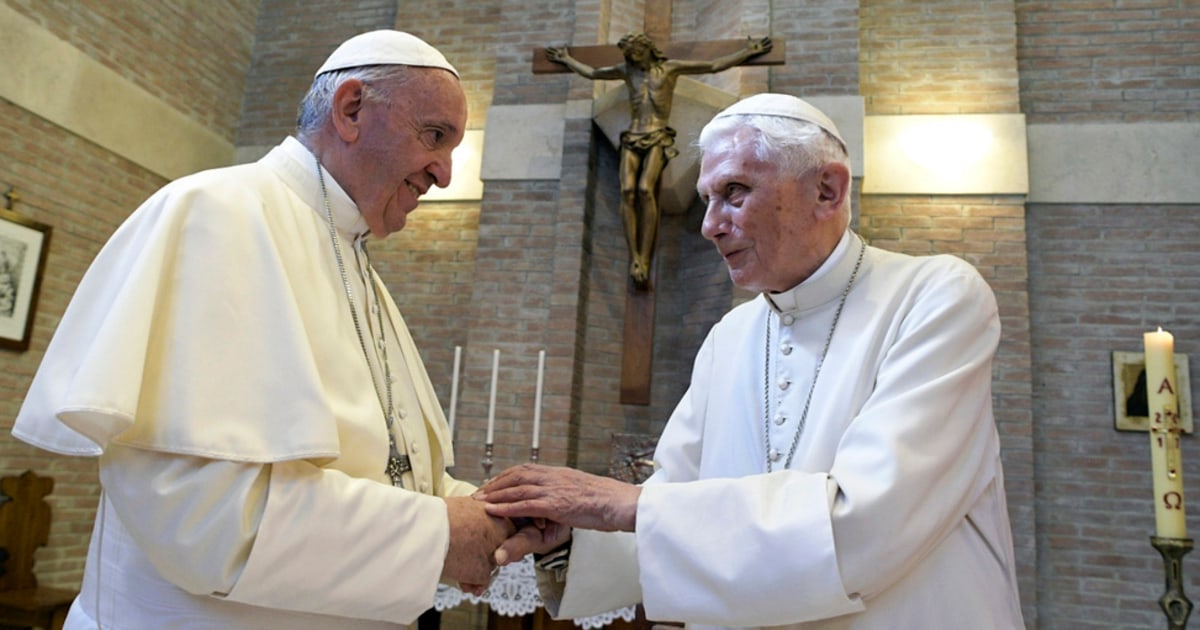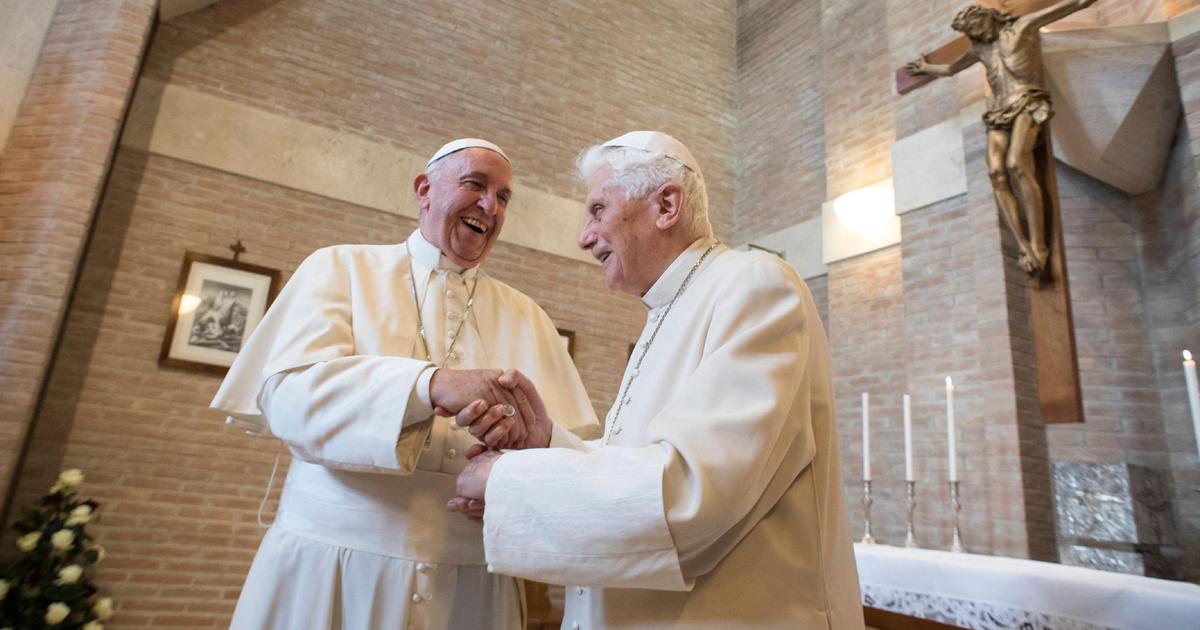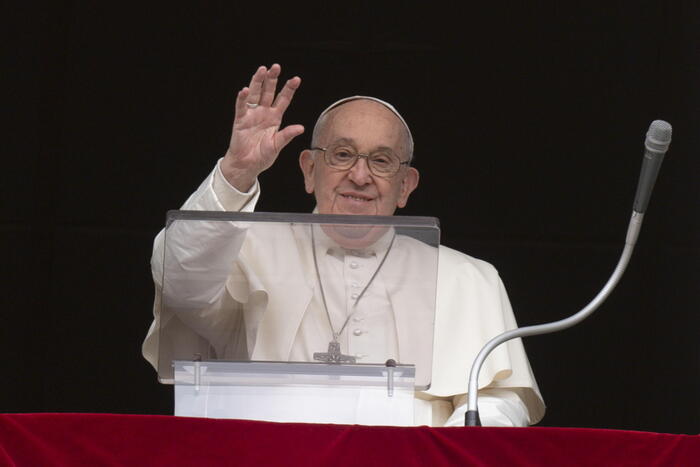Enlarge image
Joseph Ratzinger, Pope Emeritus Benedict XVI.
Photo: A1809 epa ansa Ettore Ferrari/ dpa/dpaweb
Pope Emeritus Benedict XVI.
has rejected central allegations in the Munich abuse scandal.
In a letter he also sent a "sincere apology" to all victims of abuse.
He still doesn't seem to want to admit any real wrongdoing.
"In the huge work of those days - the drafting of the statement - an oversight occurred," writes Ratzinger.
This error was not intentional "and is, I hope, also excusable".
The fact that this oversight "was used to doubt my truthfulness, yes, to portray myself as a liar, struck me deeply," writes the former pontiff.
The canon lawyers Stefan Mückl, Stefan Korta and Helmuth Pree as well as the Cologne lawyer Carsten Brennecke also published a so-called fact check on Tuesday.
In it, they take a position on what they consider to be controversial points from the Munich abuse report.
The approximately 1900-page report had the Pope Emeritus Benedict XVI.
Misconduct in dealing with the abuse was alleged in at least four cases.
In their current statement, the canon lawyers deny the allegation that Cardinal Joseph Ratzinger used priest Peter H., who was later convicted of abuse, in pastoral care at the beginning of 1980, knowing that he was aware of his sexual offenses, which were already known within the church, and thus operating a cover-up.
The fact-checkers acknowledge that Joseph Ratzinger was present at the Ordinariate meeting on January 15, 1980, contrary to what he stated in his statement to the reviewers.
At this meeting, Priest H., who had been transferred from the diocese of Essen to the archdiocese of Munich and Freising, was discussed.
The H. case: Ratzinger knew neither about abuse nor about pastoral care
However, Benedict's fact researchers emphasize that Ratzinger, in his capacity as Archbishop of Munich, had no knowledge that Priest H. was an abuser.
He was also not aware that the clergyman was employed in pastoral care.
In addition, it can be inferred from the files that in the Ordinariate meeting in question no decision was made on priest X's pastoral work.
Sexual abuse was also not discussed.
Those present only discussed the accommodation of the young priest H., who was to undergo therapy in Munich.
This request was met.
Why H. should start therapy was "not mentioned in the session."
»Benedict XVI
didn't lie"
The opinion of the experts, Benedict XVI.
I deliberately made false statements about his presence in the Ordinariate meeting on January 15, 1980, and therefore lied, the canon lawyers reject.
»The statement in Benedict XVI's statement that he did
not take
part in the Ordinariate meeting on January 15, 1980 was wrong.
Nevertheless, Benedict XVI.
not lied or deliberately made false statements,” it says.
The signatories of the statement state that they supported Benedikt in answering the extensive list of questions for the report - also because there were references to canon law.
Only Stefan Mückl was granted electronic file inspection "without being able to save, print out or copy documents".
No other employee was able to view the files.
»Not actively requested«
Mückl prepared the approximately 8,000 pages of file inspection.
In the next step, Stefan Korta made a transmission error unnoticed.
"Korta erroneously recorded that Joseph Ratzinger was absent from the Ordinariate meeting on January 15, 1980." This error was not noticed later either.
So you have "relyed on the erroneously incorrect information" and not "actively asked" again.
Benedict XVI
did not recognize the error due to the high time pressure, "but relied on the supposed written record of his absence".
One could blame Benedict XVI for this transmission error.
do not accuse them of intentionally misrepresenting or even lying, according to the undersigned.
Denying his presence made no sense at all, because statements by Joseph Ratzinger were recorded in the minutes of the meeting.
"The presence of Joseph Ratzinger was thus obvious."
Also in Peter Seewald's biography of Benedict XVI.
as well as in media reports from 2010, the presence is mentioned.
"The report presents no evidence that it behaves otherwise."
Ratzinger's employees also see no fault in the three other cases of alleged misconduct on the part of the emeritus pope.
In these cases, too, he had no knowledge that the priests were abusers.
"The report presents no evidence that it behaves otherwise."
Even one of the experts said when the abuse report was presented on January 20 that there was no proof.
However, according to his subjective opinion, it was "overwhelmingly probable".
The undersigned also took a position on an extremely controversial statement made by Benedict: "Pastor X attracted attention as an exhibitionist, but not as an abuser in the strict sense." .
His supporters say: »Benedict XVI.
did not play down exhibitionism in the statement, but expressly condemned it.
The sentence, which serves as supposed evidence of a trivialization of exhibitionism, has been taken out of context."
Benedict XVI
explicitly describe acts of abuse as "terrible", "sinful", "morally reprehensible" and "cannot be made good again". It was only stated in the canonical assessment that, according to the law applicable at the time, according to the assessment of the canonical employees, exhibitionism was not was a canon law crime, since the relevant penal provision did not factually record such behavior.
ala





